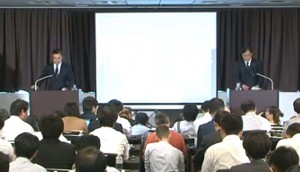Despite being faced with impossible goals and a shortage of resources, engineers at Mitsubishi Motors Corp. were caught up in a corporate culture that wouldn’t allow them to say, “No,” according to an internal investigation of the maker’s fuel economy cheating scandal.
The report, compiled by a team of outside investigators, had harsh words for the scandal-plagued automaker, which admitted in April it had rigged mileage numbers on vehicles sold in Japan for as much as a quarter century.
“There was utterly no consciousness that the company must work as one to make and sell cars,” according to the 37-page report. Mitsubishi, it concluded, is a company “not having the manufacturing philosophy of an automaker.”
The scandal was uncovered by Mitsubishi’s long-time ally, Nissan Motor Co., which raised questions about the mileage of several microcars. Those so-called “kei cars,” including the Roox hatchback, were produced by Mitsubishi but sold under Nissan nameplates.
The smaller maker admitted rigging the numbers to improve its appeal in a highly competitive but relatively low-profit market segment. It subsequently acknowledged cheating on a variety of other products, though Mitsubishi officials continue to insist the subterfuge only impacted vehicles sold in the Japanese home market.
The revelations led to a sharp drop in sales for Mitsubishi and, with its stock price plunging, it agreed to sell a controlling stake to Nissan, even as it launched the probe into the mileage rigging.
The scandal was just the latest to hit the automaker. Early in the millennium, it was revealed that Mitsubishi had also hidden serious safety problems responsible for at least one death. Meanwhile, a series of financial irregularities nearly resulted in bankruptcy, the automaker salvaged only by a coordinated rescue among Japanese banks. But, the report appears to suggest, the focus shifted to cost-cutting, putting more strain on Mitsubishi engineers.
Unable to deliver the mandated fuel economy improvements, key engineers began falsifying data. And the corporate culture prevented others from reporting the subterfuge,
“That the company did not take a united, cooperative approach to developing cars was a key factor behind the falsifications,” reported Yoshiro Sakata, a member of the investigation team, during a Japanese news conference revealing the results of the probe.
(Hacked Mitsubishi Outlander generates new cybersecurity concerns. Click Here for the story.)
For his part, MMC Chief Executive Osamu Masuko didn’t disagree with the findings. After bowing deeply to express his shame for the scandal, Masuko told his audience, “There were missed opportunities to deal with issues at the division.”
The CEO remained with Mitsubishi after the Nissan takeover, but a number of other senior managers have either been forced out or taken sharp cuts in pay.
(Mitsubishi earnings hammered by scandal. Click Here for more.)
Nissan, which paid $2.2 billion for its stake in Mitsubishi, has promised to fix the problems. It hopes that the acquisition will help it improve its position in the Japanese kei car market. There are also potential synergies between the two companies in other areas. Nissan has taken a leadership role in vehicle electrification with models like its Leaf battery car. Mitsubishi is also active in that segment with vehicles such as the little i-MiEV electric model and the new Outlander plug-in hybrid.
The question is how well – and how quickly – can the small maker recover.
“We hope this will mark a new beginning for us as a manufacturer,” Masuko told reporters after the presentation of the panel’s findings.
Mitsubishi isn’t the only Japanese automaker to have admitted cheating on mileage. Suzuki, another major player in the kei car market, also rigged its numbers, forcing the ouster of the carmaker’s long-time chief executive and namesake Osamu Suzuki.
(Mitsubishi hints at high-end plug-in hybrid with Ground Tourer Concept. Click Here to check it out.)


